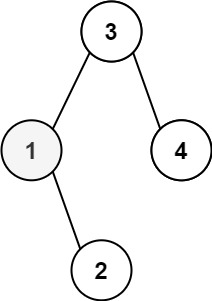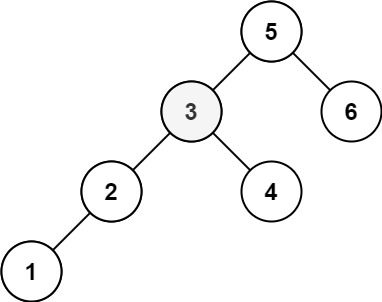LeetCode-in-All
230. Kth Smallest Element in a BST
Medium
Given the root of a binary search tree, and an integer k, return the kth smallest value (1-indexed) of all the values of the nodes in the tree.
Example 1:

Input: root = [3,1,4,null,2], k = 1
Output: 1
Example 2:

Input: root = [5,3,6,2,4,null,null,1], k = 3
Output: 3
Constraints:
- The number of nodes in the tree is
n. 1 <= k <= n <= 1040 <= Node.val <= 104
Follow up: If the BST is modified often (i.e., we can do insert and delete operations) and you need to find the kth smallest frequently, how would you optimize?
Solution
/**
* Definition for a binary tree node.
* public class TreeNode {
* public var val: Int
* public var left: TreeNode?
* public var right: TreeNode?
* public init() { self.val = 0; self.left = nil; self.right = nil; }
* public init(_ val: Int) { self.val = val; self.left = nil; self.right = nil; }
* public init(_ val: Int, _ left: TreeNode?, _ right: TreeNode?) {
* self.val = val
* self.left = left
* self.right = right
* }
* }
*/
class Solution {
func kthSmallest(_ root: TreeNode?, _ k: Int) -> Int {
var vals = [Int]()
var minVal = Int.max
var maxVal = Int.min
traverse(root, &vals, &minVal, &maxVal)
var countingArray = Array(repeating: -1, count: maxVal - minVal + 1)
for val in vals { countingArray[val - minVal] = val }
var i = 0
for val in countingArray {
guard val != -1 else { continue }
i += 1
if i == k { return val }
}
return -1
}
private func traverse(
_ node: TreeNode?,
_ arr: inout [Int],
_ minVal: inout Int,
_ maxVal: inout Int
) {
guard let node else { return }
minVal = min(minVal, node.val)
maxVal = max(maxVal, node.val)
arr.append(node.val)
traverse(node.left, &arr, &minVal, &maxVal)
traverse(node.right, &arr, &minVal, &maxVal)
}
}

